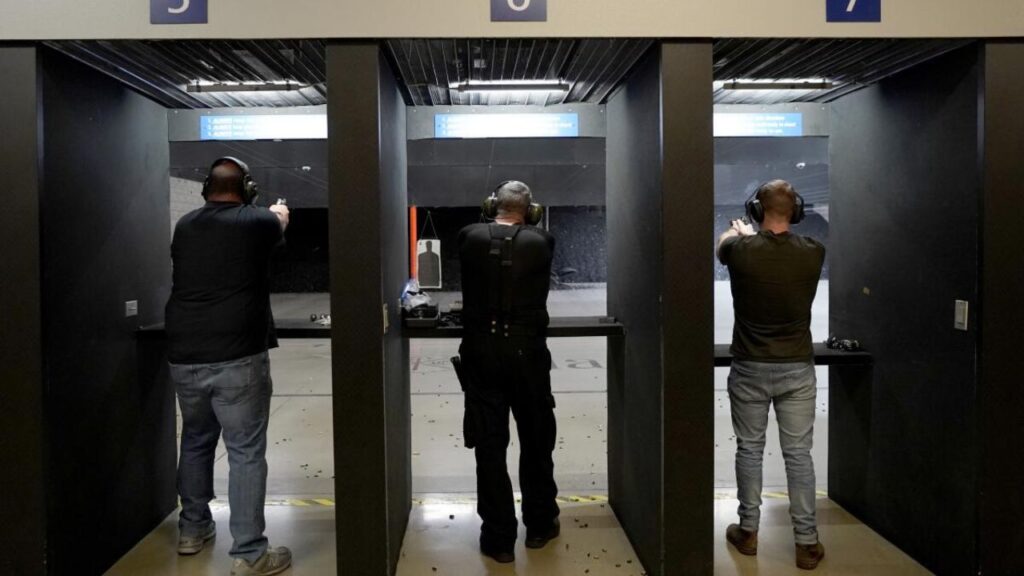A new California law that bans people from carrying firearms in most public places has once again been blocked from taking effect as a court challenge continues. The law, which was set to take effect on January 1, 2024, prohibits people from carrying concealed guns in 26 places including public parks and playgrounds, churches, banks and zoos.
The law also bars people from having concealed guns at privately owned commercial establishments that are open to the public, unless the business’s operator posts a sign allowing license holders to carry guns on their property.
Background
The law, Senate Bill 2, was signed by Democratic Gov. Gavin Newsom in September 2023, in response to a landmark ruling by the U.S. Supreme Court in June 2022 that expanded gun rights nationwide. The Supreme Court in that case struck down New York’s strict gun-permit regime and declared for the first time that the right to keep and bear arms under the Second Amendment protects a person’s right to carry a handgun in public for self-defense. The ruling also set out a test to assess the constitutionality of gun laws by holding that they must be “consistent with the nation’s historical tradition of firearm regulation”.
California, which has some of the strictest gun-control laws in the United States, was among a group of states with laws similar to those in New York and, following the Supreme Court’s decision, moved to revamp its firearms regulations. Under California’s new law, people could not carry concealed guns in 26 categories of “sensitive places” such as hospitals, playgrounds, stadiums, zoos and places of worship, regardless of whether or not they had permits to carry concealed weapons.
Legal Challenge
A group of concealed-carry permit holders and gun rights groups, including the Second Amendment Foundation, Gun Owners of America and the California Rifle & Pistol Association, sued to block the law, arguing that it was unconstitutional. They claimed that the law violated their right to self-defense and that the list of “sensitive places” was too broad and arbitrary.
On December 20, 2023, U.S. District Judge Cormac Carney, an appointee of the Republican former president George W. Bush, agreed and blocked the law pending the outcome of the case. Carney wrote that the law was “sweeping, repugnant to the Second Amendment, and openly defiant of the Supreme Court”. He wrote that gun rights groups were likely to succeed in proving it unconstitutional, meaning it would be permanently overturned.
However, on December 30, 2023, a three-judge panel of the Ninth U.S. Circuit Court of Appeals suspended Carney’s injunction, allowing the law to take effect on January 1, 2024, while the litigation plays out. The panel issued an administrative stay that put the injunction on hold until a different Ninth Circuit panel can consider whether to issue an even longer pause. The attorneys for both sides are scheduled to file arguments to the appeals court in January and February 2024.
Reactions
Newsom praised the appeals court’s decision, saying that it will allow California’s “common-sense gun laws” to remain in place while the state appeals Carney’s “dangerous ruling”. He said that Californians overwhelmingly support efforts to ensure that places like hospitals, libraries and children’s playgrounds remain safe and free from guns.
On the other hand, the plaintiffs expressed disappointment and vowed to continue their fight to protect their constitutional rights. Alan Gottlieb, the founder of the Second Amendment Foundation, said that the appeals court’s stay was “a slap in the face to millions of law-abiding gun owners in California”. He said that the law effectively bans concealed carry in most of the state and that the plaintiffs will not give up until they secure a permanent injunction.
Conclusion
The legal battle over California’s new law banning the carrying of firearms in most public places is not over yet. The law, which was enacted after a Supreme Court ruling that recognized the right to carry a handgun in public for self-defense, has been challenged by a group of gun rights advocates who claim that it infringes on their Second Amendment rights. A federal judge agreed and blocked the law, but an appeals court put the law back into effect while the case proceeds. The outcome of the case could have significant implications for the future of gun regulation in California and across the nation.


